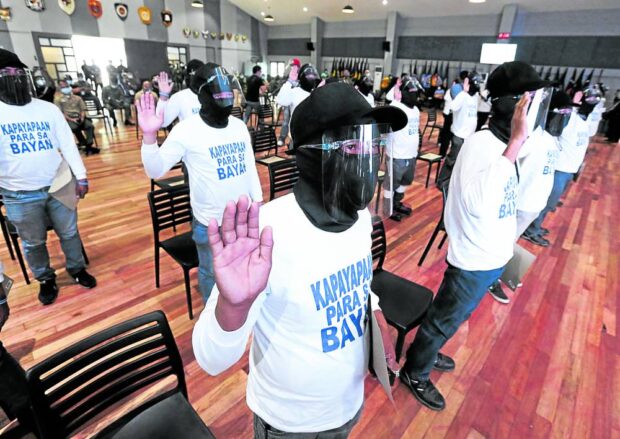Like predecessors, Bongbong Marcos offers amnesty to rebels

OUT OF THE MOVEMENT Some 30 rebels of the New People’s Army return to the fold of the law as they swear allegiance to the Republic in this 2021 ceremony led by the National Capital Region Police Office. —MARIANNE BERMUDEZ
President Ferdinand Marcos Jr. has issued a series of proclamations granting amnesty to communist and Moro secessionist rebels, although some of the groups they are associated with had already signed peace agreements with the government.
In a statement on Friday, the Presidential Communications Office (PCO) said Mr. Marcos’ proclamations were part of the government’s “comprehensive peace initiatives” with the country’s leading rebel groups.
The President on Wednesday issued Proclamations Nos. 403, 404, 405 and 406, granting amnesty, respectively, to members of the Rebolusyonaryong Partido ng Manggagawa ng Pilipinas-Revolutionary Proletarian Army-Alex Boncayao Brigade (RPM-RPA-ABB), a breakaway coalition of the communist movement; the Communist Party of the Philippines (CPP)-New People’s Army (NPA)-National Democratic Front of the Philippines (NDFP); the Moro Islamic Liberation Front (MILF); and the Moro National Liberation Front (MNLF). The MNLF entered into a peace agreement with President Fidel Ramos on Sept. 2, 1996. This led to a transitional government in the Autonomous Region in Muslim Mindanao (ARMM) headed by MNLF chair Nur Misuari.
The MILF, which broke away from the MNLF in 1980, signed a peace agreement with President Benigno Aquino III on March 27, 2014. This brought about the formation of the Bangsamoro Autonomous Region in Muslim Mindanao led by the MILF.
There has been no breakthrough of lasting impact in the peace talks relating to the 54-year-old communist insurgency that began during the dictatorship of the President’s father, even with the amnesty proclamations issued by three post-Edsa presidents, namely Corazon Aquino, Fidel Ramos and Gloria Macapagal-Arroyo.
Article continues after this advertisementREAD: PNP, gov’t security agencies laud President’s amnesty grant to ex-rebels
Ramos, Duterte orders
Proclamation Nos. 403, 405 and 406 grant amnesty to “members [of the concerned rebel groups] who have committed crimes punishable under the Revised Penal Code and special penal laws in furtherance of their political beliefs,” while Proclamation No. 404 grants amnesty to “former members of the … CPP-NPA-NDF” who have committed such crimes also in furtherance of their political beliefs.
Article continues after this advertisementThe grant of amnesty does not cover such crimes as terrorism, kidnap-for-ransom, massacre, rape, crimes committed against chastity, drug-related charges, torture, grave violations of the Geneva Convention of 1949, genocide and war crimes.
But “those charged, detained or convicted of common crimes [and] who can establish by substantial evidence that they have actually committed said crimes in pursuit of political beliefs” may avail themselves of amnesty, according to the proclamations.
The PCO said Executive Secretary Lucas Bersamin also signed Executive Order No. 47 on Wednesday, amending then President Rodrigo Duterte’s Exectuive Order No. 125, which created the National Amnesty Commission (NAC).
“In issuing the order, the President (Marcos) said that there is a need to amend and update the functions of the [NAC] to cover the processing of the applications for amnesty under the new proclamations,” the PCO said.
Duterte’s 2021 order creating the NAC followed 27 years after Ramos’ Proclamation No. 347, which also formed the NAC and assigned this body the processing of amnesty proclamations.
‘Significant steps’
That year, Duterte also issued Proclamation Nos. 1090 and 1091, granting amnesty to members of the MILF and the MNLF, respectively—seven years after the MILF’s peace deal and 25 years after the MNLF’s peace deal with the government.
In a statement, National Security Adviser Eduardo Año said “We recognize these proclamations as significant steps towards national healing and peace-building. By providing a path for former rebels to return to the fold of the law, the national amnesty program contributes to the overall stability and unity of our nation.”
‘Skeptical’
Undersecretary Ernesto Torres Jr., executive director of the National Task Force to End Local Communist Armed Conflict (NTF-Elcac) said in his statement “The amnesty initiative seeks to weave together the threads of justice, reconciliation, understanding, unity, and progress, transcending past grievances towards a shared vision of a unified and peaceful Philippines.”
READ: Bongbong Marcos granted amnesty to rebel returnees, insurgents – EO
Defense Secretary Gilberto Teodoro Jr. said “This is a step towards, if not cessation, reducing ostensible support of our remaining rebel forces.”
But lawmakers of the Makabayan bloc were skeptical about Mr. Marcos’ proclamations.
“If the government is serious or sincere in wanting peace, then it should reopen the peace negotiations with the National Democratic Front of the Philippines. There should be no conditions in offering amnesty to rebels. They should also remove the tag of communist terrorist groups,” ACT Teachers Rep. France Castro said.
Kabataan Rep. Raoul Danniel Manuel warned that “This amnesty grant may also end up as a means [of] racketeering and could be a source of corruption by the military. They can tag someone as a rebel even if that person is not, and then grant amnesty.”
“If the President really wants peace, there should first be a cessation of state-perpetrated human rights violations in the country. Political prisoners should be released and the terrorist tag on the NDF, Communist Party of the Philippines and the New People’s Army should be removed. The peace talks should also resume—we must reenter the sphere of peace negotiations,” Gabriela Women’s Party Rep. Arlene Brosas said. —WITH REPORTS FROM DEXTER CABALZA, JULIE M. AURELIO AND NATHALIE GRACE ADALID